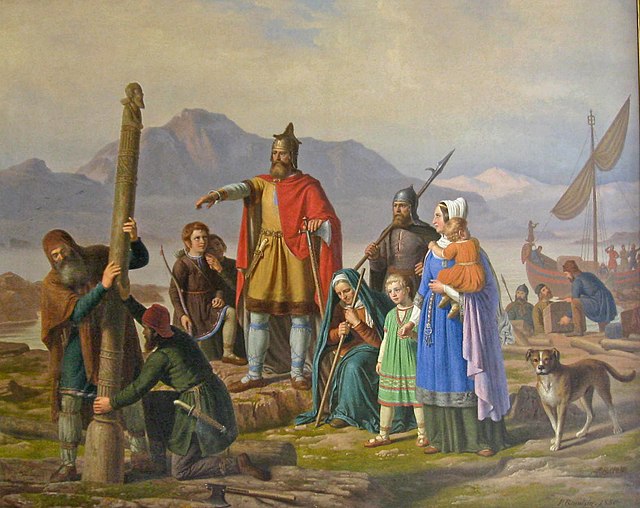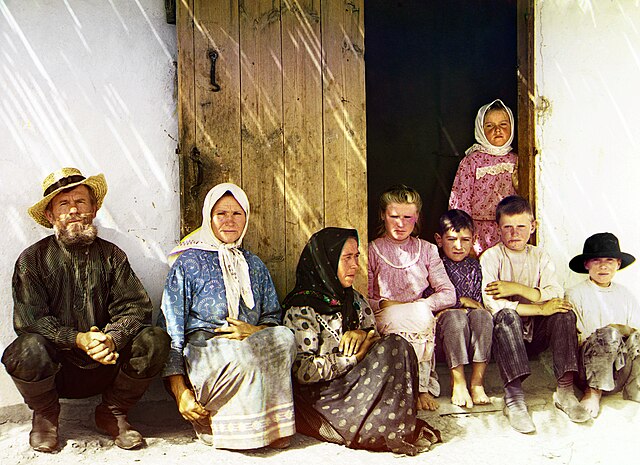Loading AI tools
Person who has migrated to an area and established permanent residence there From Wikipedia, the free encyclopedia
A settler is a person who migrates to a new region to establish a permanent presence there. A settler is also called a pioneer if the land that they migrated to was previously uninhabited or sparsely populated. Settlers come from a sedentary society, which has developed in a generally fixed geographical location, in contrast to a nomadic society, which does not have a fixed habitat and moves around seasonally with various settlements.

The process of settling land can be, and has often been, controversial: while human migration is a normal phenomenon by itself, it has not been uncommon throughout human history for settlers to have arrived in already-inhabited lands without the intention of living alongside the native population. In these cases, the conflict that arises between the settlers and the natives (or Indigenous peoples) may result in the dispossession of the latter within the contested territory, usually violently.[1] While settlers can act independently, they may receive support from the government of their country or empire or from a non-governmental organization as part of a larger campaign. The lifestyle of a native population is often disturbed or destroyed if they come into contact with a settler population that seeks to replace them.[2]

Many times throughout history, settlers occupied land that was previously inhabited by long-established peoples, who are designated as native or Indigenous. Additional terms may be used to describe the Indigenous peoples of the Americas and Indigenous Australians, such as Aborigines, First Nations, or Native Americans. In the United States, the terms "Indian" and "American Indian" are still common, but controversial. In order to avoid confusion with actual Indians or Indian Americans (as the Italian explorer Christopher Columbus mistakenly believed that he had arrived in India when he discovered the Americas in the 15th century), the terms "East Indian" and "Asian Indian" are also used to differentiate Indians from the Indigenous peoples of the United States.
The process by which Indigenous territories are settled by foreign peoples is usually called settler colonialism.[3] It relies upon a process of often violent dispossession.[1]
In the figurative usage, a "person who goes first or does something first" also applies to the American English use of "pioneer" to refer to a settler – a person who has migrated to a less occupied area and established permanent residence there, often to colonize the area; as first recorded in English in 1605.[4] In United States history, it refers to the Europeans who were part of the process of settling new lands on Indigenous territories.
In this usage, pioneers are usually among the first to an area, whereas settlers can arrive after first settlement and join others in the process of human settlement.[citation needed] This correlates with the work of military pioneers, who were tasked with construction of camps before the main body of troops would arrive at the designated campsite.

The Russian Empire regularly invited Russian subjects and foreign nationals to settle in sparsely populated lands, mostly in North Asia, but also in Central Asia.[5] These settlers were called colonists.[citation needed] These projects resulted in the inception of Slavo-Serbia, Volga Germans, Volhynia, and Russians in Kazakhstan, among other phenomena.
Although settlers in the early modern era frequently made use of sea routes—significant waves of settlement could also use long overland routes, such as the Great Trek by the Boer-Afrikaners in South Africa, or the Oregon Trail in the United States.[citation needed]
Anthropologists record the tribal displacement of native settlers who drive another tribe from the lands it held, such as the settlement of lands in the area now called Carmel-by-the-Sea, California, where the Ohlone people settled in areas that were previously inhabited by the Esselen people.[6]

In Canada, the term "settler" is currently used to describe "the non-Indigenous peoples living in Canada who form the European-descended sociopolitical majority" and thereby asserting that settler colonialism is an ongoing phenomenon. The usage is controversial to some.[7][8][9]
In the Middle East and North Africa, there are a number of references to various squatter and specific policies that are referred to as settler-oriented in nature. Among those:[citation needed]
The reasons for the emigration of settlers vary, but often they include the following factors and incentives: the desire to start a new and better life in a foreign land, personal financial hardship, social, cultural, ethnic, or religious persecution (e.g., the Pilgrims and Mormons), penal deportation (e.g. of convicted criminals from England to Australia), political oppression, and government incentive policies aimed at encouraging foreign settlement.[16][17][18]
Seamless Wikipedia browsing. On steroids.
Every time you click a link to Wikipedia, Wiktionary or Wikiquote in your browser's search results, it will show the modern Wikiwand interface.
Wikiwand extension is a five stars, simple, with minimum permission required to keep your browsing private, safe and transparent.